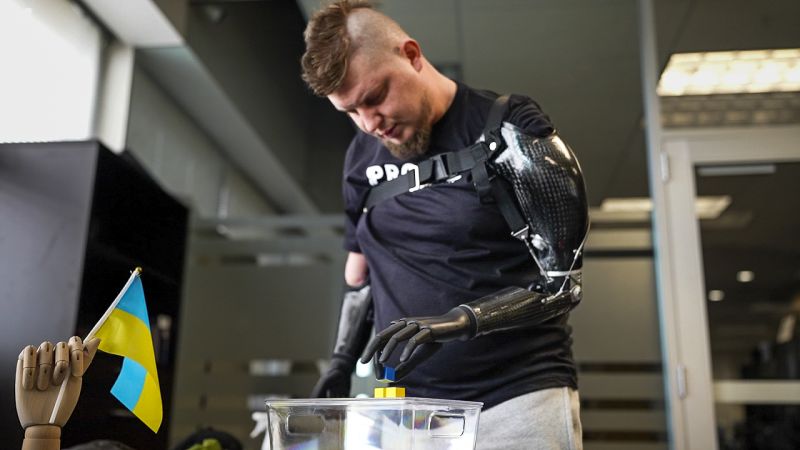Since the start of the war in Ukraine, an estimated 20,000 soldiers have lost limbs, typically ending their military careers. However, advancements in bionics are allowing some veterans to resume their duty. Valera Kucherenko, who lost both hands in a grenade attack, was fitted with two bionic hands from Esper Bionics, a Ukrainian-US based company. These hands, equipped with artificial intelligence, are helping users regain functions quickly and even potentially gain functions they didn’t originally have with human limbs.
Dima Gazda, the CEO of Esper Bionics and a physician and engineer from Ukraine, believes that AI will be the next step in bionics. The Esper Hand is designed to quickly learn its user’s behavior and choose hand grips they will need. The AI-empowered hand can also detect muscle activity, making it more intuitive for the user to control. With six different motors, one for each finger and two for the thumb, the Esper Hand is built more precisely to mimic human limbs and allow for more natural movement.
While Esper Bionics has had success with providing Esper Hands to 70 Ukrainian soldiers, there is still a significant need that outweighs the current supply. Approximately 170 people are on the waitlist, and with the fighting in Ukraine ongoing, the demand for bionic prosthetics will continue to increase. These advancements in bionics are not only helping soldiers regain their functions but also providing hope for a better quality of life for those who have lost limbs in combat.
The Esper Hand is the first product from Esper Bionics, which has been built with AI capabilities from the beginning. Gazda and his team have worked for several years to perfect the technology in the bionic hand, ensuring that it is able to adapt to the user’s needs and provide a seamless user experience. The AI in the prosthetic is able to learn and anticipate the user’s movements, making it more efficient and intuitive for the individual to control.
Artificial Intelligence is disrupting many industries, and bionic prosthetics are no exception. With the use of AI or machine learning, patients who have lost limbs can potentially regain functions they thought were lost forever. Gazda believes that AI will play a crucial role in the future of bionics, offering unprecedented solutions for users to enhance their capabilities. By combining advanced technology with precision engineering, companies like Esper Bionics are revolutionizing the field of bionic prosthetics and providing hope for those who have suffered life-altering injuries.
Valera Kucherenko’s story is just one of many Ukrainian soldiers who have been able to return to their duty thanks to bionic prosthetics. With the help of advanced technologies like the Esper Hand, individuals who have lost limbs in combat are finding new ways to function and improve their quality of life. As the demand for bionic prosthetics continues to grow in conflict zones like Ukraine, companies like Esper Bionics are at the forefront of providing innovative solutions that offer hope and resilience to those who have sacrificed so much for their country.


